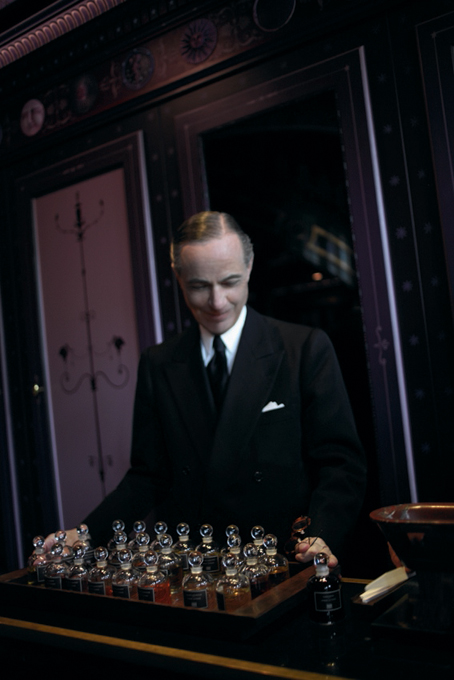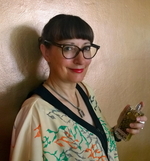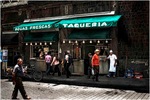Interview with Serge Lutens Around El Attarine And Serge Noire {Passion for Perfume - Portrait}

•• Interview with Serge Lutens Around El Attarine And Serge Noire ••
1) TSS: El Attarine is a reference to Arabian culture, to a well-defined place, the coranic school of Fès. It was written regarding Serge Noire that it is a perfume "without a sense of place". Are these two perfumes complementary ones for you?
- Serge Lutens: "El Attarine" is a perfume which synthetizes all the history or rather that spirit which presided over the birth of my perfumery, which has its roots in Morocco.
"Serge Noire" is not a perfume without a sense of place. It is quite the opposite in fact! It is situated on my own itinerary. I imagined and created Dior makeup and its image from 1968 to 1980. This period made me experience the last moments of what I would term "Parisian Haute Couture" (La Haute Couture parisienne): luxury (genuine, this time) rigor, mastery and respect for the feminine body image. That muffled atmosphere of the show rooms, of the fashion presentations - much more ritualistic than fashion shows are - made the perfume come to fruition in me. [It used to be] an ethereal atmosphere, an elegance that is silent on a background of black serge suit materials, pale complexions, and tight straight hairdos......
2) - What are the main ingredients - or particular effects - which define the olfactory personalities of El Attarine and Serge Noire?
- "El Attarine" is symbolic and names everything that smells good; this said without any olfactory or gustatory distinction; one could add to that the sense of sight and touch. It is a skin perfume with aromatic elements emphasized by an atmosphere of dry flowers.
"El Attarine" is not a perfume of the sun, but inspired by the sun.
In "Serge Noire" there is a much more literary ambiance, a modernity, at the same time that it transcribes the past, revisited and amended. This perfume is ash-like, woody-dry. It is a condiment of memory, a subtlety. It exudes from it an atmosphere of powdered, sensual and transparent body. In short, it is my favorite!
3) - The creation of El Attarine seems to have been first undertaken a long time ago. You allude to a more recent marketing study...
- I do not have recourse to market studies nor focus groups. I put them at a distance. "El Attarine" is not a conclusion but a homage paid to what gave rise to my taste for perfumes, derived from my Moroccan experience. Which means that - and this is probably the meaning of your question - I have never loved nor now have any love for perfumes that are the results of polls.
4) -What is the meaning of the color symbolism in Serge Noire?
- You probably mean that feminine atmosphere which expresses itself thanks to a black tailored suit: a straight skirt and a rigorously cut jacket in serge (a twill weave that can be assimilated to the "grain de poudre") and these pale girls liking this style?
"El Attarine" is golden-yellow, solar; "Serge Noire" is wholly crystal, transparent. It evokes black.
5) - How do you know when you have found a valuable idea for a perfume? Some writers, for example, mention the first sentence of their novels as being a foundational stone.
- I would say that contrary to what one can imagine, the first sentence of a novel or the head note of a perfume are written when one has finished the novel, because the latter, at the moment it is being conceived has already found a place in ourselves.
6) - You say "one does not create a perfume solely with the nose" - what are the extra-olfactory ingredients that make a perfume be a perfume in the strongest sense of the term rather than a non-fragrance? What would be a perfume that is not really a perfume for you? How do you define the word "perfume"?
- A perfume is an answer that you give, a retort, its very formulation, even in some cases its conclusion. A perfume is an answer for the woman or the man who acquires it. It is a way of saying, "Here, this is the dot on the "I". The principle can originate from olfaction (woods, flowers...), from literature or any other things...
7) - In the texts accompanying El Attarine and Serge Noire, you make an allusion to a "skin" and "white skins" respectively. Why this fascination for the skin this time around?
- The skin is the only carrier and the only reader which translates your affinity with a perfume. A natural perfume will evolve differently on each individual's skin. A perfume in which too many synthetic elements were put will smell identical on all the skins.
8) - Regarding El Attarine, you say, "it is an accord born out of a disagreement in the first person" What is the nature of this disagreement? Would you then consider it to be your most personal fragrance?
- My most individual perfume is "Serge Noire" (the most personal one) hence this play upon the name. I refer to my dissension, which is to have decided to generate perfumes. By this I mean that if I conceived them it is precisely because I did not like them the way they were found in existence. My dissension was the principle upon which my perfumery was built.
9) The rumor has spread that Féminité du Bois will be reintroduced under your name - is it true? If yes, will the perfume flacon remain the same?
- To your first question , I would answer, "yes".
To your second one....the perfume is a Serge Lutens perfume, even if this was integrated into the perfumery of the Shiseido group. It will thus take its place, inside the same flacon as the ones used for Serge Lutens perfumes: the rectangular one, my pocket-sized perfume bottle!
10) - Do you experience just as much pleasure today as in the past when composing fragrances? Can the creation of a perfume be a cause for suffering? Will we see many more?
- Your question is the one I ask myself. Ask a novelist if he will write another novel at the time when he is presenting his latest one! He can express a guess, but he is not sure. I would say that the word "suffering" and the word "pleasure" as well as those of "happiness" and "unhappiness" are not appropriate where I am concerned. There is, at most, during the gestation of a perfume, a tension, a breathing, a relaxation, and in the end, a smile, or a "phew" born out of a sense of relief: the perfume!
11) - Are there any raw materials or mythical ingredients of perfumery in particular to which you would like to bring your own interpretation in the future?
- I think that there are more than 2000, if not 3000 ingredients, that can be used in a perfume composition. As for myself, I have my own fetishes and use them in the same way that a writer uses language.
I think that it is much more important to make room for what must be said, or if you will here, smelled...than to the components making up a fragrance.
The rarity and beauty of a text does not come from the use of words that are never or rarely employed but from the ensemble which comes through as the best way to express it. "It is rare, but I am not hungry". "I am familiar with it, but it is good!"









